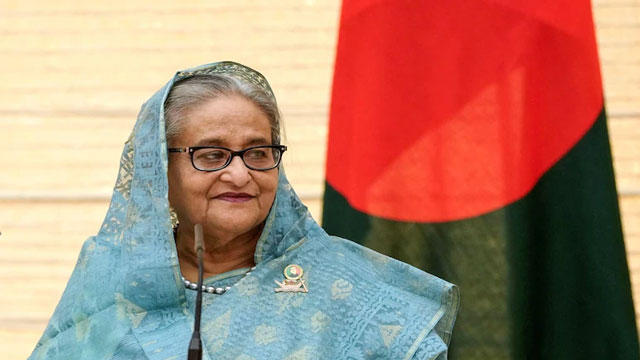Daijiworld Media Network - Bangladesh
Bangladesh, Nov 19: In a development that has shaken Bangladesh’s political and judicial landscape, the death sentence handed to former Prime Minister Sheikh Hasina by the International Crimes Tribunal–Bangladesh (ICT-B) has come under intense scrutiny, with numerous constitutional, legal, and procedural discrepancies casting serious doubt on the credibility of the entire trial process.
The tribunal, revived under the International Crimes (Tribunals) Act of 1973, has been criticised for being based on legislation originally framed to address crimes committed during the 1971 Liberation War. Legal experts argue that extending its jurisdiction to events unrelated to that period represents a fundamental misapplication of the Act. Matters intensified after controversial amendments made post 5 August 2024 through a Presidential Ordinance. With Parliament not properly constituted and the President lacking authority under Article 93, constitutional lawyers have termed the amendments invalid from the very outset. The disputed dissolution of Parliament prior to these developments has further clouded the legitimacy of all subsequent decisions.

Serious concerns emerged after the Chief Justice and five senior judges of the Appellate Division stepped down on 10 August 2024, allegedly under pressure from an agitating student mob. Their sudden exit paved the way for the appointment of new ICT-B judges under circumstances viewed as both irregular and politically influenced. Chairman Golam Mortuza Majumder, previously a retired district judge, was elevated to the High Court merely six days before the tribunal announced it would take up the high-profile cases. Mohitul Haque Mohammad Enam Chowdhury and Shafiul Alam Mahmud were appointed as permanent High Court judges without undergoing the mandatory two-year probation stipulated by Article 98. Observers note that within a year, more than twenty judges perceived to have ties to Jamaat-e-Islami were similarly elevated. Adding to concerns, none of the judges on the tribunal possess experience in international criminal law, a core requirement for adjudicating charges of genocide and crimes against humanity. Questions of political alignment have also surfaced regarding Shafiul Alam Mahmud, whose past association with a BNP-backed panel at the Supreme Court Bar Association continues to raise eyebrows.
Questions over neutrality deepened further with the appointment of Mohammed Tajul Islam as Chief Prosecutor. His previous role as counsel for convicted war criminals has sparked allegations of partisan motivations. The appointment of international lawyer Toby Cadman, who once defended Jamaat leaders, as Special Adviser has also been interpreted as an attempt to reinforce a predetermined prosecutorial direction. These suspicions intensified when the tribunal, on 18 November 2024, ordered investigators to complete a genocide investigation within one month, an extraordinary demand for a case of such magnitude.
Equally troubling is the manner in which Sheikh Hasina’s defence was handled. She repeatedly stated that she was denied the right to appoint lawyers of her choosing. The state-appointed counsel, Md Amir Hossain, admitted that he made no attempt to contact her and held no expertise in international criminal law. In a move widely criticised, he was assigned to represent both Hasina and the former Home Minister, creating a clear conflict of interest. The defence team received the full set of prosecution documents only on 25 June 2025, barely weeks before the trial, and no request was filed for additional time despite the volume of evidence. Efforts to cross-examine witnesses were severely curtailed after prosecutors invoked a 2013 judgment to block questions on contradictions. Ironically, the same prosecutors had opposed such limitations during earlier war crimes trials involving Jamaat leaders. When senior Supreme Court lawyer Z.I. Khan Panna attempted to represent Hasina in August 2025, the tribunal rejected his application, citing that the testimony stage had already commenced.
Concerns intensified after the verdict, when the defence lawyer stated he was prevented from filing an appeal because the accused were considered absconding and that he was not even given a copy of the tribunal’s judgment. Legal scholars argue that conducting a capital trial in the absence of the accused violates fundamental principles of justice. The trial itself, which ran from 3 August to 23 October 2025 with testimony concluding by 8 October, has been described as unusually rushed for a case involving complex allegations and extensive documentation.
The political environment surrounding the trial has been equally contentious. Since 5 August 2024, more than two hundred cases have reportedly been filed against Sheikh Hasina alone, while over a thousand cases have named nearly four hundred former ministers, MPs, and party functionaries. Many FIRs allegedly list unnamed individuals or accuse the same persons in multiple locations on the same day, raising suspicion of politically motivated targeting. This period also saw the tribunal move to restrict media coverage of Hasina’s remarks, and a wave of arrests allegedly carried out without proper warrants. Even as Awami League leaders and supporters faced custodial deaths, violence inside court premises, and forensic inconsistencies, individuals linked to Jamaat-e-Islami and extremist organisations were reportedly released or granted bail.
The tone of public statements made by senior officials before the trial’s conclusion has raised additional alarm. Chief Prosecutor Tajul Islam, on 17 October 2024, described the issuance of an arrest warrant for Hasina as a “remarkable day,” while IT Advisor Nahid Islam declared days later that Hasina could “return only to walk the gallows.” Legal analysts argue that such remarks, made even before proceedings commenced, reflect a mindset inconsistent with the presumption of innocence.
Despite Bangladesh being a State Party to the Rome Statute since 2010, the interim government chose not to refer the case to the International Criminal Court. According to observers, inconsistencies in the tribunal’s structure, process, and evidence may have made an ICC review difficult for the authorities to justify.